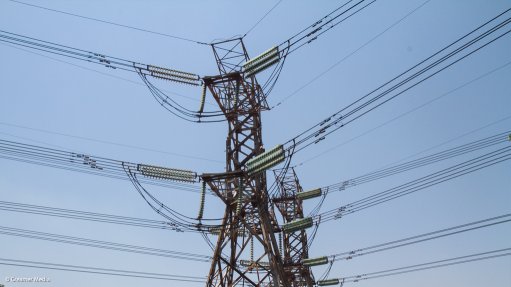Decarbonisation is urgent imperative, says coal mining company Exxaro

Exxaro CEO Dr Nombasa Tsengwa presentation covered by Mining Weekly’s Martin Creamer. Video: Shadwyn Dickinson.
JOHANNESBURG (miningweekly.com) – Decarbonisation of coal mining company Exxaro’s operations and entire value chain is an urgent imperative to reduce carbon dioxide emissions, which will result in the additional benefits of avoiding market barriers, fines and the loss of social licence to operate.
Exxaro Resources CEO Dr Nombasa Tsengwa highlighted this on Thursday, August 17, when the Johannesburg Stock Exchange-listed company reported that worsening electricity shortages were presenting opportunities for its renewable energy business, which reported improved 17% higher half-year revenue.
Overall, the JSE-listed black-empowered diversified resources and renewable energy group reported a 28% decrease in earnings before interest, taxes, depreciation and amortisation (Ebitda) to R7 661-million.
“By accelerating our decarbonisation plan, we can also realise cost savings, partnership opportunities and favourable financing terms,” Tsengwa said during the half-year results presentation covered by Mining Weekly. (Also see attached Creamer Media video.)
Decarbonisation is described as being central to the strategy of the company, which is looking to contribute “meaningfully” to the energy transition, through renewable-energy generation for its own operations and other customers, alongside the production of critical minerals, such as copper, manganese and bauxite.
Outlined was how the transition to clean energy hinged on clean energy technology supply chains to source critical minerals, as steel from manganese and iron-ore will be required for wind turbines, plus more copper for transmission lines and offshore wind power, and even more aluminium from bauxite to support solar photovoltaic plants.
“We are aware as well of the increasing scrutiny and pressure to which coal companies are subjected. This manifests through the exit of some international investors from the sector, while multinationals reorganised their portfolios.
“As a result, we are happy to report that we have revised our Scope 1 and Scope 2 emission targets to 40% by 2026. We have finalised our value chain Scope 3 analysis with the majority from our Eskom supply, very much around 97% of our Scope 3. Hence we need to pursue other Eskom suppliers to partner with us in dealing with Scope 3 emissions,” said Tsengwa.
DEVASTATING WAR
The challenges presented by the prolonged and devastating war in Ukraine, together with its knock-on implications for broader Europe and energy security across vulnerable economies softened volatile commodity prices, and high inflation, were having a significant impact on the mining industry, hurting margins and cash flows.
The 28% decrease in half-year Ebitda to R7 661-million was driven by lower thermal coal prices, which slipped by over 60% from the highs of 2022, and lower production volumes owing to sub-par rail performance and lower offtake from Eskom arising from equipment unavailability.
The company's resilient performance despite lower export sales prices and volumes, and ongoing logistical challenges, has been reported amid:
- added uncertainty around the intensity and the duration of global macroeconomic volatility;
- the much-anticipated tailwinds from the Chinese economic recovery not yet being realised; and
- the continued increase in interest rates by the US Federal Reserve contributing to the lingering retreat of global markets and the softening of commodity prices
Securing a sustainable future remains a key priority for governments and businesses around the world, which translates into intensified opposition to coal mining and coal-fired power generation.
So, too, however, has the need to ensure that the future supply of critical minerals is secured to meet the rush to the net-zero emissions target by 2050.
Given all the market dynamics in play, it is essential that companies have the balance sheet strength to navigate the volatility and uncertainty, which means adopting a bias towards cash preservation in anticipation of headwinds.
"The preservation results in under-investment in new projects in mining and slower mergers and acquisitions (M&A) activity in the industry. Although we have seen several high-value transactions within the M&A landscape, this has largely been driven by a few major mining companies, concentrated on scarce operational top-tier assets.
"We also see governments of critical minerals-producing countries altering the playing fields through the proactive introduction of structural adjustments and policies to discourage exports in favour of domestic manufacturing – and this is happening in Africa, by the way."
This is done to simultaneously control prices so that countries can capture more value from these minerals, which poses a significant risk and greater competition for these minerals, thus demanding disciplined and well-considered investment strategies to meet the urgency required for future supply.
This provides a backdrop against which global energy businesses must operate and while issues around energy security present opportunities for Exxaro as a business for further uptake of renewables by customers, given this enduring state of polycrisis, the company recognises that M&A decisions will need to be focused on building resilience and long-term value creation – and not as an immediate reaction to prevailing volatility.
"The dynamics that have played out over the first six months of this year to June 30 reiterate that rapid and unpredictable change will continue to unfold.
"We’ve seen weakened thermal coal demand from Europe due to sufficient stocks combined with materially lower natural gas prices and improved renewable energy performance.
"We saw thermal coal prices fall by over 60% from record highs of 2022 to a two-year low of $99/t, so it's important to remember, however, that current pricing remains stronger than those we achieved pre-2022," added Tsengwa.
The company’s margins are cushioned against the cyclical nature of these commodities.
"You can see that the API4 price averaged $130/t in the first half compared with the average of $264/t in the second half of last year, while iron-ore fines averaged $118/t versus $101/t during this period.
"In addition to this, our domestic supply, especially to Eskom, further protects our margin from global market volatility, making our stock much more defensive," she added.
Changes in the global trade flows were evident as Australia resumed supply into China in the first half after it had been halted since December of 2021, while the Russian supplies to Europe and Japan reduced materially.
Importantly, India remains as a strong importer of coal from South Africa, which remains a challenging operating environment, particularly when the country's ability to respond to the opportunities presented by high thermal coal prices of the recent past and the ever-shifting trade flows, is constrained by sub-par rail performance.
"We’ve continued to experience recurring locomotive unavailabilities due to reported cable theft, derailments, operational inefficiencies and vandalism.
"The current softer pricing environment has rendered the trucking of coal, which is inherently a sub-optimal transport alternative, no longer feasible.
"This has further limited access to Richards Bay Coal Terminal and alternative ports," Tsengwa pointed out.
Lower Eskom demand from Exxaro's Grootegeluk mine is not from a lack of Eskom’s need for coal, but due to prolonged periods of unrepaired equipment at Matimba, which may be an indication of skills availability and possibly prioritisation within Eskom itself.
However, Exxaro has no doubt that these volumes will be required for Medupi and Matimba and is very confident that Eskom will resolve short-term disruptions to this offtake.
Article Enquiry
Email Article
Save Article
Feedback
To advertise email advertising@creamermedia.co.za or click here
Comments
Press Office
Announcements
What's On
Subscribe to improve your user experience...
Option 1 (equivalent of R125 a month):
Receive a weekly copy of Creamer Media's Engineering News & Mining Weekly magazine
(print copy for those in South Africa and e-magazine for those outside of South Africa)
Receive daily email newsletters
Access to full search results
Access archive of magazine back copies
Access to Projects in Progress
Access to ONE Research Report of your choice in PDF format
Option 2 (equivalent of R375 a month):
All benefits from Option 1
PLUS
Access to Creamer Media's Research Channel Africa for ALL Research Reports, in PDF format, on various industrial and mining sectors
including Electricity; Water; Energy Transition; Hydrogen; Roads, Rail and Ports; Coal; Gold; Platinum; Battery Metals; etc.
Already a subscriber?
Forgotten your password?
Receive weekly copy of Creamer Media's Engineering News & Mining Weekly magazine (print copy for those in South Africa and e-magazine for those outside of South Africa)
➕
Recieve daily email newsletters
➕
Access to full search results
➕
Access archive of magazine back copies
➕
Access to Projects in Progress
➕
Access to ONE Research Report of your choice in PDF format
RESEARCH CHANNEL AFRICA
R4500 (equivalent of R375 a month)
SUBSCRIBEAll benefits from Option 1
➕
Access to Creamer Media's Research Channel Africa for ALL Research Reports on various industrial and mining sectors, in PDF format, including on:
Electricity
➕
Water
➕
Energy Transition
➕
Hydrogen
➕
Roads, Rail and Ports
➕
Coal
➕
Gold
➕
Platinum
➕
Battery Metals
➕
etc.
Receive all benefits from Option 1 or Option 2 delivered to numerous people at your company
➕
Multiple User names and Passwords for simultaneous log-ins
➕
Intranet integration access to all in your organisation



















